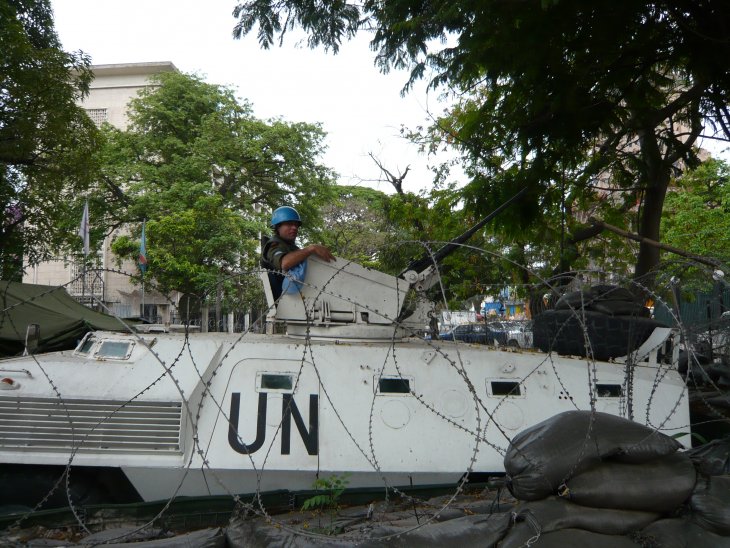The 2018 Nobel Peace Prize has been awarded to Denis Mukwege and Nadia Murad in recognition of their work combatting sexual violence as a weapon of war. This acknowledgement should serve as a rallying cry to end sexual violence in conflict — commonly perpetrated by non-state groups, but also states or entities aspiring to statehood.

UN Soldier in the DRC. Photo: Nic Marsh / PRIO.
Murad and Mukwege come from two conflict zones where sexual violence has been rampant – in one case openly authorized from the top, and in the other as a practice tolerated by commanders or resulting from peer pressures.
Nadia Murad has courageously talked and written about her experiences surviving sexual violence perpetrated by the Islamic State (ISIS/ISIL), and is fighting for justice for survivors and the Yazidis.
ISIL promoted sexual slavery as part of its military enterprise – an extension of its battlefield success and, ultimately, its governance model. Sexual violence committed by ISIL stands out because of the numerous acts its fighters and supporters perpetrated and supported, and because the group proudly proclaimed sexual slavery as part of its state-building project, using it as a recruiting tool for men to join its ranks.
ISIL sees itself to be above reproach, promoting sexual slavery as a ghanima (i.e., property taken from the enemy by force), lawful under the law of war.
Sexual violence, which includes rape, sexual slavery and other violations, is illegal under international law, and is acknowledged as a grave security concern by the UN Security Council. ISIL, however, rejects the legitimacy of the UN, including its Muslim-majority member states. Instead, it cites the premodern law of war in Islam to justify its actions.
ISIL sees itself to be above reproach, promoting sexual slavery as a ghanima (i.e., property taken from the enemy by force), lawful under the law of war. As sabaya (women captives in war) and jariyat (slave girls), women become the properties of ISIL fighters. As Murad experienced, she and other victims were subjected to sexual violence at the hands of ISIL fighters, who sold them to other fighters when they ceased to meet their desires.
After Nadia Murad and other Yazidi women and children were enslaved following ISIL’s takeover of their town, Sinjar, ISIL openly reported the event in its Dabiq magazine, celebrating that “the Yazidi women and children were then divided according to the Shari’ah amongst the fighters of the Islamic State who participated in the Sinjar operations.”
In a later issue of Dabiq, and using the voice of an unidentified woman, Umm Sumayyah al-Muhajirah, ISIL promoted the virtues of sexual slavery. It contended that ISIL fighters who bed slave girls are not rapists, since ‘some slave girls in our State are now pregnant and some of them have even been set free for Allah’s sake and got married in the courts of the Islamic State after becoming Muslims’. In short, the group does not consider itself to be committing sexual violence and prides itself for lawfully practicing sexual slavery.
In the eastern DRC, sexual violence has been perpetrated by all sides of the conflict. Captured civilians also report having been forced by armed groups to perpetrate sexual violence against members of their own community or family. Dr. Mukwege and his team have treated survivors of traumatic fistulas and other obstetric problems from rape.
Research has shown that some soldiers rationalize the sexual violence that occurs in DRC, even though their rationale differs from that of ISIL. Though soldiers themselves consider sexual violence as illegal, they nevertheless rationalize it as an understandable consequence of being an underpaid and undervalued soldier unable to fulfill masculine ideals in society.
Research has also shown that the ideology and message from the leadership is an important determinant of what behavior emerges within the organization’s rank and file. Sexual violence is likely to occur when members of an organization are told the practice is legal and virtuous; when the practice is widespread, perpetrators might lose their pre-war sensitivities, and the violence becomes normalized as war drags on. Even when an organization has a policy of prohibiting sexual violence, silent acceptance can develop, and commanders might turn a blind eye on such violations.
Group dynamics are also important for explaining sexual violence. When soldiers are recruited by force or join out of fear, sexual violence might be used as a socialization mechanism, where recruits are encouraged or pressured into perpetrating sexual atrocities. This functions as a way to break the new recruits’ bonds to life outside the group, and the peer-pressures and punishments for defection further encourage violence for survival and status in the group.
Two decades of social science research has shown that these sexual violence crimes are not inevitable and unavoidable collateral damage; that it can be mitigated, prevented, stopped, and punished.
The UN has passed several resolutions to stop sexual violence in war. In 2008, UN Resolution 1820 demanded ‘the immediate and complete cessation by all parties to armed conflict of all acts of sexual violence against civilians,’ and ‘the need for the exclusion of sexual violence crimes from amnesty provisions in the context of conflict resolution processes’. Yet, a decade later, the international community has failed to end impunity for sexual and gender-based violence.
Ending sexual violence in conflict depends on understanding why and how it occurs, and on the will of the international community to make sexual violence a war crime worthy of conviction. When sexual violence is widespread, or when the leaders of perpetrating organizations condone and justify this behavior as legal, constitute hard cases for prevention and mitigation. However, these are the cases that will test the international community’s resolve and determine whether the leaders of the world actually mean it when they have so clearly stated that impunity for sexual violence must end now. The Nobel Peace Prize of 2018 reminds us of and reinforces that pledge.